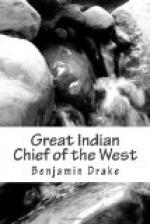The office of war chief is never hereditary, but results from skill and intrepidity in battle, and is held so long as those qualities are successfully retained. It may readily be conceived that among such a race the war chiefs, having the braves and young men of the nation under their command, would generally maintain a controlling influence. The leading war chief is always better known than the principal peace chief, is often confounded with him, and still oftener exercises his authority.
The Sauks are, at the present time, divided into twelve families, and the Foxes into eight, each known by the name of some animal. Among the Sauks there is another division peculiar to it. The males are all classed in two parties or bands—one called Kish-ko-guis, or long hairs; the other Osh-cushis or braves, the former being considered something more than brave. In 1819 each party numbered about four hundred members, and in 1826, the number was increased to five hundred in each. The standard of the Kish-ko-guis or long hairs, is red, and that of the Osh-cushis or braves, blue. Every male child, soon after its birth, is marked with white or black paint, and is classed in one of these two parties, the mother being careful to apply the two colors alternately, so that if the number of males in a family be even, each band will receive an equal number of members, and the whole nation will thus be nearly equally divided into the two colors of black and white. These distinctive marks are permanently retained through life, and in painting themselves for any ceremonies or public occasions, those of one party use white, the others black paint, in addition to other colors which may suit their fancy. The reason of this singular custom is for the purpose of creating and keeping alive a spirit of emulation in the tribe. In their games, sham-battles and other pastimes, the whites and blacks are opposed to each other; and in war, each party is ambitious of bringing home a greater number of scalps than the other.
The chiefs have the management of public affairs, but as we have already seen are more or less influenced, especially in matters of war or peace, by the braves. In their councils, questions are not considered, generally, as decided, unless there be unanimity of opinion. Their laws are few and simple. Debts are but seldom contracted by them, and there is no mode of enforcing their collection. For redress of civil injuries, an appeal is usually made to some of the old men of the tribe, mutually selected by the parties concerned; and their decision is considered as binding. A murder among them is seldom punished capitally. The relatives of the deceased may take revenge in that way, but it is much more common to receive compensation in property. If the relatives cannot agree upon the amount of the compensation, the old men of the tribe interfere and settle it. The kinsfolk of the deceased say, that by killing the murderer, it will not bring the dead to life, and that it is better




